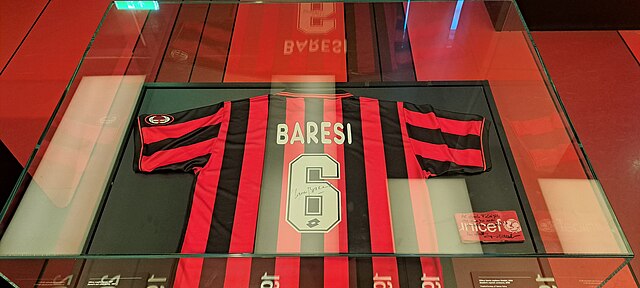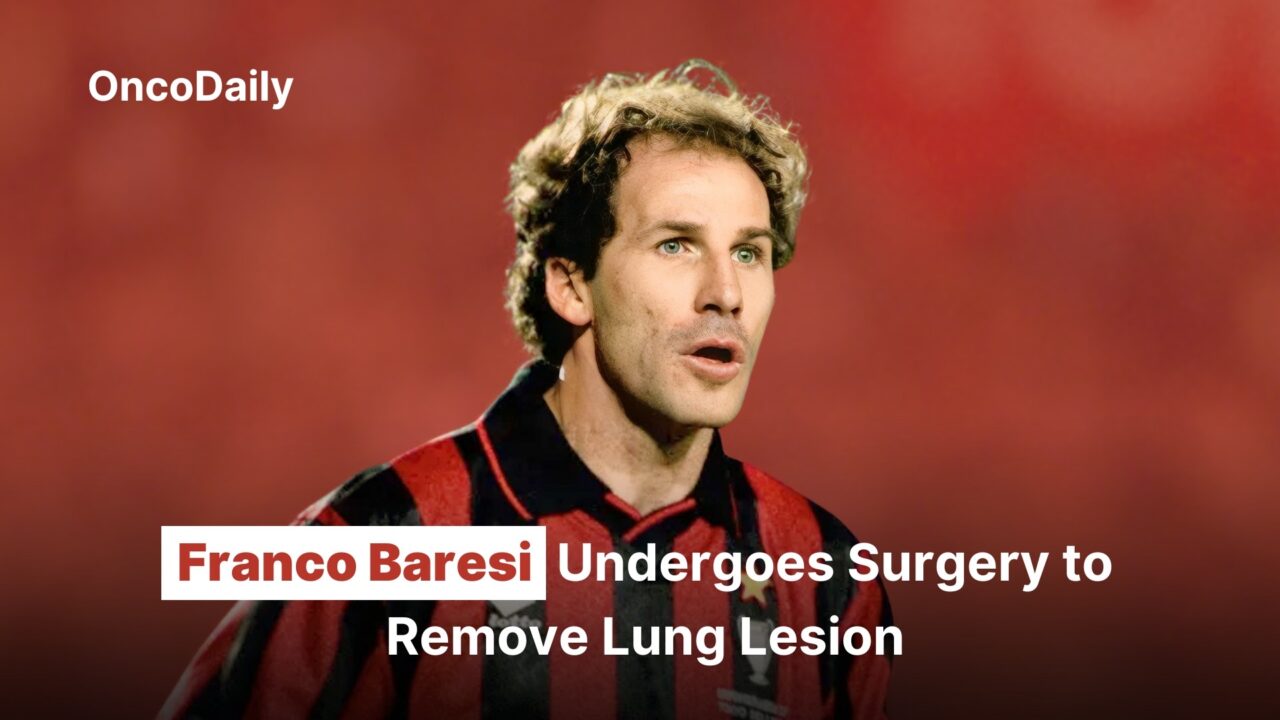Franco Baresi is widely regarded as one of the greatest defenders in the history of football. A devoted one-club man, he spent his entire professional career at AC Milan, becoming a true icon and captain for nearly two decades. Known for his remarkable leadership, tactical intelligence, and defensive skills, Baresi won numerous domestic and international titles with the club and remains a beloved figure in the football world.

Recently, news emerged that Baresi underwent surgery to remove a lung lesion following a routine medical check. The procedure was successful, and he is currently in recovery, receiving continued care with optimism for a full return to health.
How Early Detection and Advanced Care Helped Franco Baresi Overcome a Lung Health Scare
Franco Baresi, the legendary former AC Milan captain, recently underwent surgery to remove a pulmonary nodule that was discovered during a routine medical examination. The nodule, which is a small growth in the lung, was identified early, allowing doctors to opt for a minimally invasive surgical procedure. This approach helped reduce the risks typically associated with lung surgery and has contributed to a smooth and complication-free recovery so far.
The surgery took place in early August 2025, and following the successful removal of the lesion, Baresi has been closely monitored by his medical team. As part of the ongoing management of his condition, an oncology specialist recommended a consolidative course of immunotherapy. This treatment aims to strengthen his immune system’s ability to prevent recurrence and support long-term health. Baresi has publicly expressed his gratitude for the support he has received from AC Milan, the medical staff, and fans worldwide. While acknowledging that it will take some time to regain his full strength, he remains optimistic and focused on his recovery journey.
AC Milan has also conveyed strong support, with official statements from the club’s Board of Directors, management, and players sending their best wishes for Baresi’s swift and complete recovery. The football community, both in Italy and internationally, has rallied around the former captain during this challenging period, reflecting the deep admiration and affection held for him.
This health update reminds us of the importance of routine medical screenings and early intervention, which can make a significant difference in outcomes when dealing with serious conditions such as lung lesions. Baresi’s experience is raising awareness and offering hope to others facing similar challenges.
How Did AC Milan and the Football Community Respond to Franco Baresi’s Surgery?
AC Milan promptly released an official statement following Franco Baresi’s surgery to remove a pulmonary nodule. The club confirmed that the operation was performed using a minimally invasive technique and went smoothly without complications. They reported that Baresi is currently recovering well and will soon begin a consolidative course of immunotherapy under the care of oncology specialists.
The entire organization—from the Board of Directors and management to the players and coaching staff—expressed their heartfelt wishes for Baresi’s swift and full recovery. AC Milan hailed Baresi not only as a legendary former captain and player but also as their current Honorary Vice President, emphasizing the deep respect and admiration they hold for him.
The football community, especially AC Milan supporters, has rallied around the club legend, sending messages of support and encouragement across social media and fan networks, reflecting the profound impact Baresi has had on Milan’s history and culture.
Franco Baresi himself shared a personal message with fans and well-wishers, expressing gratitude for the support and transparency about his recovery journey:
“Dear fans, I just want to let you know that it will take me a little time to get back to full strength. Thank you to AC Milan and to all of you for your support. A big hug, with affection.”
This warm and humble note reassured supporters and highlighted Baresi’s enduring connection to the club and its community during this challenging time.
Franco Baresi’s Early Career and Legacy
Franco Baresi began his football journey as a youth player at AC Milan, joining the club’s academy in 1972. After five years of development, he made his professional debut with Milan’s senior team in 1977 at the age of 17. Early on, Baresi showcased exceptional talent as a defender, playing primarily as a sweeper (libero) – a role that suited his outstanding tactical awareness and ability to read the game. His first full season in 1978-79 coincided with AC Milan winning the Serie A title, marking the beginning of a storied career .
Baresi’s development continued rapidly, even after Milan faced relegations to Serie B in the early 1980s due to a match-fixing scandal. Demonstrating loyalty and resilience, he stayed with the club and helped Milan return to Serie A, solidifying his status as a cornerstone of the team. Over his 20-year career (1977–1997), Baresi amassed an extraordinary 719 official appearances for AC Milan across all competitions, including Serie A, Coppa Italia, and European tournaments .

Known for his leadership qualities, Baresi became Milan’s captain and led the team for 15 seasons. Under his captaincy, the club enjoyed an era of immense success, securing six Serie A titles and three European Cups (now UEFA Champions League trophies). He was pivotal in transforming AC Milan into one of the strongest defensive units in football history, renowned for his calm composure, anticipation, and fierce loyalty to the club .
Internationally, Baresi represented Italy 81 times, scoring one goal, and was part of the Italian national team that won the 1982 FIFA World Cup. He also played in multiple European Championships and World Cups, notably captaining Italy to the 1994 FIFA World Cup final .
Beyond his playing career, Baresi transitioned into coaching and various roles within the AC Milan organization, contributing to youth development and club management. His jersey number 6 was retired by Milan in 1997, a testament to his legendary status and lasting impact.
Franco Baresi remains widely celebrated as one of the greatest defenders of all time, both for his technical skills and his embodiment of commitment to a single club throughout his lengthy career.
You Can Also Read Francesco Acerbi and Testicular Cancer: The Defender’s Fight and Triumphant Return to Football by Oncodaily

How Are Pulmonary Nodules Diagnosed and Managed?
A lung lesion, also referred to as a pulmonary nodule, is a small, abnormal area of tissue found in the lungs. These lesions are often detected incidentally during routine imaging tests such as chest X-rays or CT scans. Lung lesions vary widely in nature—they may be benign (non-cancerous) or malignant (cancerous). According to medical research, lung nodules smaller than 3 centimeters are common, and only a fraction of these lesions eventually turn out to be cancerous.
The clinical significance of a lung lesion depends largely on its size, shape, growth rate, and other imaging characteristics. Lesions that display irregular shapes, spiculated edges, or increasing size over time are more likely to be malignant, which is why they often require further diagnostic procedures or surgical removal to confirm the diagnosis and ensure early treatment.
In the broader context of cancer, lung cancer remains the leading cause of cancer-related death worldwide. In the United States alone, it is estimated that approximately 226,650 new cases of lung cancer will be diagnosed in 2025, with around 124,730 deaths attributed to the disease, according to the American Cancer Society (ACS) . Early detection through imaging plays a crucial role in improving survival rates since lung cancer diagnosed at a localized stage has a five-year survival rate of about 65%, compared to less than 10% if diagnosed at a distant metastatic stage .
The discovery of a lung lesion does not immediately imply a cancer diagnosis. Many lesions are benign conditions caused by infections, inflammation, or scar tissue. However, because lung lesions may represent early-stage lung cancer or pre-cancerous changes, doctors often recommend surgical removal or biopsy for definitive diagnosis, especially if the lesion meets criteria indicating higher malignancy risk.
Routine monitoring and timely intervention are essential in managing lung lesions effectively. Minimally invasive surgical techniques allow for precise removal of suspicious lesions while reducing patient recovery time and complications. This proactive approach has greatly enhanced lung cancer outcomes, highlighting the importance of medical vigilance for individuals with detected lung lesions.
You Can Also Watch Franco Baresi Testimonial Match | AC Milan v All Stars
Importance of Early Detection and Treatment
Routine medical screenings and early intervention play a critical role in improving outcomes for potentially serious lung conditions, including lung cancer. Lung lesions, when identified early—often through imaging such as low-dose computed tomography (CT) scans—can be treated effectively, significantly increasing survival rates.
A landmark international study led by researchers at Mount Sinai demonstrated that lung cancer patients diagnosed via annual low-dose CT screening have an 81% 20-year survival rate, compared to the national average five-year survival rate of just 18.6% for all lung cancer patients . Early-stage lung cancer, particularly stage I disease measuring 10 mm or less, showed a 20-year survival rate of approximately 92 to 95%, highlighting the life-saving potential of early detection .
Despite these benefits, fewer than 6% of individuals eligible for lung cancer screening undergo routine scans, underscoring the urgent need for increased awareness and access to screening programs . The U.S. Preventive Services Task Force currently recommends annual low-dose CT screening for adults aged 50 to 80 years with a significant smoking history (20 pack-years) who currently smoke or quit within the past 15 years .
Beyond screenings, lung health awareness and preventive measures such as smoking cessation, avoiding exposure to secondhand smoke and environmental pollutants, and maintaining respiratory health through regular check-ups are essential. Early diagnosis allows for treatment options like minimally invasive surgery, targeted therapy, and immunotherapy, all of which contribute to improved quality of life and survival rates . Jing Ning Aging (Albany NY). 2021
In summary, early detection through routine medical checks can dramatically increase survival chances in lung cancer and other lung diseases. Franco Baresi’s case reinforces the importance of these practices, showing that timely intervention can provide hope and better outcomes even in serious conditions.
Written by Aharon Tsaturyan, MD


